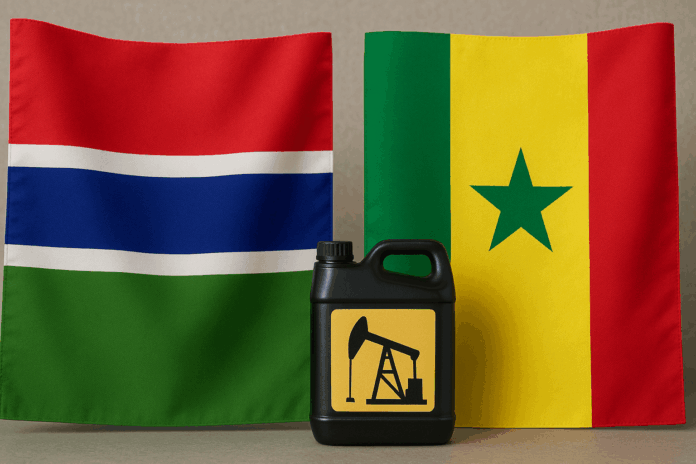Written by: Ousman F. M’Bai
The recent statement by The Gambia’s Ministry of Petroleum and Energy, issued in response to public concern over our offshore oil blocks, raises more questions than it answers.
The Ministry concedes that FAR Gambia Ltd drilled its final offshore well a mere 500 metres from the Senegalese maritime border, an admission of enormous technical and geopolitical significance. For years, Senegal has successfully developed the Sangomar oil field, with 23 interconnected wells spaced across hundreds of kilometres. A distance of 500 metres falls comfortably within the known reservoir range. In fact, FAR Ltd.’s own 2022 ASX filings state that oil was detected at the “S440 and S408 reservoir levels” and that these were “lateral equivalents” of the productive Sangomar field.
Yet, the Ministry now claims there was “no discovery warranting a conversation on joint resource development.” This is difficult to reconcile. It is the bureaucratic equivalent of an ostrich trapped in quicksand, head buried, still believing all is well.
First, FAR Ltd.’s claim that hydrocarbons were present but “non-recoverable” has never been independently verified. Neither the Gambia Petroleum Commission nor the Ministry has released drilling data or permitted any form of third-party scrutiny, despite multiple formal requests under the Access to Information Act. One would expect such disclosure to be the minimum standard especially given FAR Ltd.’s financially distressed position at the time, its conflicted dual interest in both the Sangomar field and The Gambia’s A2 block, and the fact that it had defaulted on capital calls and risked forfeiting its entire Sangomar stake without compensation. This wilful lack of oversight raises the serious risk that The Gambia’s offshore resources were misrepresented, undervalued, or quietly written off or diverted without the scrutiny or consent of the nation.
Second, the Ministry’s justification that no “discovery” occurred and thus no action was warranted is not only legally incorrect, but diplomatically negligent. Under the United Nations Convention on the Law of the Sea (UNCLOS), joint development of transboundary resources does not require full commercial discovery, before parties begin conversations on transboundary reservoir unitisation. It requires credible geological evidence only, something even FAR Ltd has publicly acknowledged exist. Yet, officials in the Ministry and the Commission appear unwilling or unable to see the wood for the trees.
Third, timing matters. FAR Ltd exited The Gambia in January 2023 under extraordinarily favourable conditions. In the months leading up to this, the company had received over $122 million in cash and contingent payments from Woodside Energy for its interest in Senegal’s Sangomar field adjacent to The Gambia’s A2 block. Then, two Deeds of Amendment were executed (August 2022 and April 2023), waiving FAR (Gambia) Ltd.’s remaining work obligations and penalties. Shortly thereafter, the 2023 Block Demarcation Regulation was enacted, quietly redrawing our maritime boundaries particularly around Block A2.
No justification has been offered. No explanation. No transparency. The sequence of events that unfolded—the waivers, the withdrawal, the redrawing of offshore block boundaries—could not have occurred without the complicity, or at minimum the acquiescence, of The Gambia’s Petroleum Commission, the Ministry of Petroleum and Energy, FAR Ltd, and quite plausibly the government of Senegal under former “dodgy” President Macky Sall. Lurking in the background is Woodside Energy, which acquired FAR Ltd.’s stake in the Sangomar field and now stands to benefit exponentially from any reservoir extension into The Gambia’s A2 block. And yet, it is shockingly apparent that Woodside conducted no meaningful due diligence into potential reservoir connectivity either before or after concluding the deal with FAR Ltd.
Fourth, the Government asserts that seismic and well data are “confidential and extremely valuable.” That may be true, but secrecy is not security. What is valuable must be protected by accountability and not concealed behind closed doors while being offered to foreign investors. To deny Gambians access to our own resources while brokering deals abroad is a profound betrayal of public trust.
Lastly, the Ministry warns against “baseless allegations and inflammatory rhetoric.” But the concerns raised by most in public and international circles are neither baseless nor rhetorical. They are grounded in legal filings, public records, corporate disclosures, and the glaring absence of independent oversight.
The Ministry and Commission must demonstrate their stated commitment to informed dialogue by:
- Publication of the full 2017 and 2023 offshore block coordinates;
- Disclosure of all correspondence and licence amendments, waivers involving FAR (Gambia) Ltd.’s exit;
- Release of the Bambo-1 and Bambo-ST1 drilling logs and pressure data;
- Evidence of the quality review it conducted on the drilling and well data before issuing FAR Ltd a closure certificate;
- Clarification on whether The Gambia has entered any maritime understandings with Senegal regarding western boundaries.
Our people deserve better than deflection. They deserve truth. Transparency. And leadership that protects the inheritance of future generations.
That future for The Gambia and for Senegambia as a whole now stands at risk. If The Gambia fails to safeguard its natural resources, Senegal must not, through silence or inaction, allow itself to be seen as a beneficiary of that failure. Shared resources in the MSGBC basin demand shared responsibility, and the principles of regional solidarity must not be compromised by opportunism or neglect.
Was this not what Sheik Al-Islam Bai Niasse, Cheikh Ahmadou Bamba, Imamoulaye and Mam Gorgui Nderry M’Bai of Sambang Wollof taught us!




